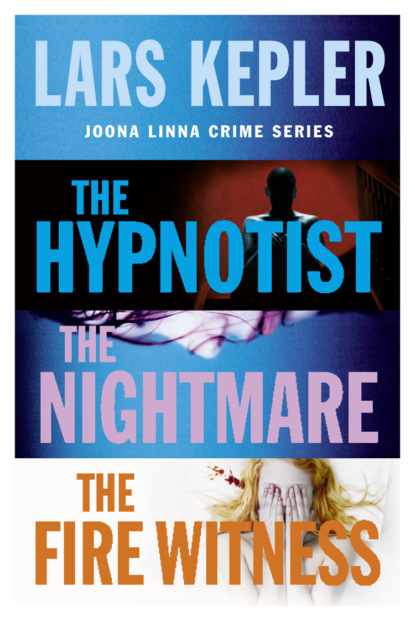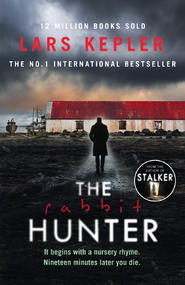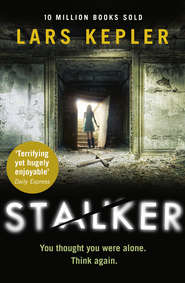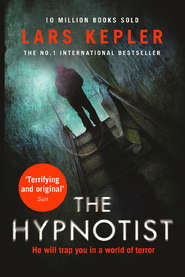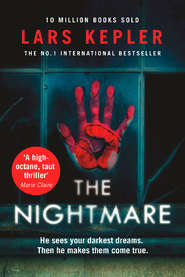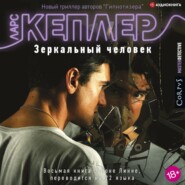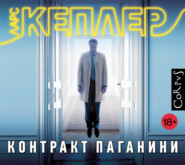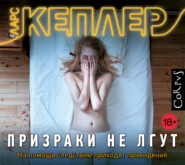По всем вопросам обращайтесь на: info@litportal.ru
(©) 2003-2025.
✖
Joona Linna Crime Series Books 1-3: The Hypnotist, The Nightmare, The Fire Witness
Настройки чтения
Размер шрифта
Высота строк
Поля
She was throwing herself back and forth on her chair. “The man is pulling and pulling at the little person, he’s pulling too hard.” Suddenly she met my gaze and stopped moving. Her lips distended in a wide, ugly grin. “Was I good?” she asked me.
I didn’t reply. I just watched as she stood up, took her coat from the hook, and calmly walked out of the room.
I wrote the haunted house on a piece of paper, wrapped it around tape number 14, and secured it with a rubber band. But instead of archiving the tape as usual, I took it to my office. I wanted to analyse Eva Blau’s lie and my own reaction, but I was still in the hall when I realised what had been wrong all along: Eva had been aware of her face and had tried to look sweet; she had not had the listless, open face that those under hypnosis always have. A person under hypnosis can smile, but it isn’t their usual smile, it’s a somnolent, slack smile.
As I turned the corner leading to my office, I saw Maja Swartling waiting outside my door. I surprised myself by remembering her name. When she caught sight of me, her face lit up and she waved.
“Sorry to keep bothering you like this,” she said quickly, “but since I’m basing part of my dissertation on your research, my advisor suggested that I interview you.” She looked at me intently.
“I understand,” I said.
“Is it all right if I ask you a few questions?” she asked.
Suddenly she looked like a little girl: wide awake but unsure of herself. Her eyes were very dark, set off against the milky glow of her fair skin. She wore her shiny hair in looped braids: an old-fashioned hairstyle, but it suited her.
“Is it all right?” she repeated softly. “You have no idea how persistent I can be.”
I realised I was standing there smiling. There was something so bright and healthy about her. She laughed and gave me a lingering, satisfied look. I unlocked the door and she followed me into the office, settled down in the visitor’s chair, and took out a notepad and pen.
“What would you like to ask me?”
Maja blushed deeply and sat, then began to talk.
“I’ve read your reports,” she said, “and your hypnosis group is made up not only of victims, people who have been subjected to some kind of abuse, but also perpetrators, those who have done terrible things to others.”
“You have to understand that sometimes the level of coercion is so great that a person is forced to commit terrible acts. The victim becomes the perpetrator through the very process of victimisation. In any event, for patients like this, it works the same way in the subconscious, and in the context of group therapy this is in fact a resource.”
“Interesting,” she said, taking more notes. “I want to come back to that, but what I’d like to know now is how the perpetrator sees himself or herself during hypnosis—after all, you do put forward the idea that the victim often replaces the perpetrator with something else, like an animal.”
“I haven’t had time to investigate how perpetrators see themselves, and I don’t want to speculate.”
Maja leaned forward, lips pursed. “But you’ve got an idea?”
“I have a patient, for example, who—” I fell silent, thinking of Jussi Persson, the man from Norrland who carried his loneliness like a dreadful self-imposed weight.
“What were you going to say?”
“Under hypnosis this patient returns to a hunting tower. It’s as if the gun is in control of him; he shoots deer and simply leaves them lying there.”
We sat in silence, looking at each other.
“It’s getting late,” I said.
“I still have a lot of questions.”
I waved my hand. “We’ll have to meet again.”
She looked at me. My body suddenly felt strangely hot as I noticed a faint flush rising on her pale skin. There was something mischievous between us, a mixture of seriousness and the desire to laugh.
“Can I buy you a drink to say thank you? There’s a really nice Lebanese—”
She stopped abruptly as the telephone rang. I apologised and picked it up.
“Erik?” It was Simone, sounding stressed.
“What’s wrong?” I asked.
“I … I’m out in back, on the bike path. It looks like someone’s broken into our home.”
An ice-cold shudder ran through me. I thought about the ferrule that had been left outside our door, the old instrument of punishment.
“What happened?”
I heard Simone swallow hard. Some children were playing in the background; they might have been up on the football pitch. I heard the sound of a whistle and screams.
“What was that?” I asked.
“Nothing, a class of schoolchildren,” she said firmly. “Erik, Benjamin’s veranda door is open and the window has been smashed.”
Maja Swartling stood and pointed at the door, asking if she should go. I nodded briefly, with an apologetic shrug. She bumped into the chair, which scraped along the floor.
“Are you alone?” asked Simone.
“Yes,” I said, without knowing why I was lying.
Maja waved and closed the door soundlessly behind her. I could still smell her perfume.
“It’s just as well you didn’t go inside,” I went on. “Have you called the police?”
“Erik, you sound funny. Has something happened?”
“You mean apart from the fact that there might be a burglar inside our house right now? Have you called the police?”
“Yes, I called Dad.”
“Good.”
“He said he was on his way.”
“Move further away from the house, Simone.”
“I’m standing on the bike path.”
“Can you still see the house?”
“Yes.”
“If you can see the house, anyone inside the house can see you.”





